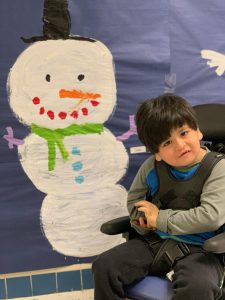None of us like winter colds. It can often feel that we stand next to one wrong person in line at the grocery store and suddenly we have a week or two of fighting off an unrelenting cold. These colds always seem to interrupt our sleep, make our thoughts fuzzy, tire us out more easily, and just generally slow us down. Still, we tend to be able to continue to function, advocate for our basic needs, and tel l others just how crummy we feel. One articulate first grader who was learning to speak English came into my classroom years ago and announced that her head was full of nose juice that made her feel like she was underwater. I’ve never heard a more specific description.
l others just how crummy we feel. One articulate first grader who was learning to speak English came into my classroom years ago and announced that her head was full of nose juice that made her feel like she was underwater. I’ve never heard a more specific description.
Of course, for Joey, and students like him, colds mean so much more. Colds threaten his general health as his body has a harder time fighting off germs. Recovery time for him can be so much longer than the rest of us. His sleep and daily rhythm are interrupted. Just saying hello or asking for help becomes a heavy chore.
When I am taking data on Joey’s communication abilities, I am constantly looking for trends. Is his communication increasing? What types of communication is he using? What encourages him to engage more? The data will reflect increases in his ability, and then, it will stop. Is he regressing? Often, there is something interfering. Colds are frequently a culprit at slowing him down.
It’s already so taxing on Joey to communicate, but throw a cold into the mix and it can grind him to a halt. This seems truly unfair because when we are sick we need to communicate more. For Joey, colds mean that not only is he putting in more effort than normal to answer my questions, but he is also trying to let me know what he needs or how he feels. All of this tires him out.
During our last session, when it became clear he was coming down with a cold, he said “sad”. We were reading a book he’d been highly engaged with the session before, and were playing with toys that he usually loves to hold. His normal spark seemed gone. “Sad” was all he could say, as he looked at me with his large eyes. It was a simple yet descriptive word for the moment – sad is how we feel when we want to do something but cannot bring ourselves to do it because of how we feel. I just wish I could have rewarded his communication attempts by taking away the cold and helping him feel better.
Those of us with typical immune systems experience colds as annoying. We can often forget people like Joey – people whose lives come to a halt because of picking up germs.
Wash your hands, get your flu shot, cough into your elbow, and do what you can to stop the spread of germs! Let’s get Joey, and everyone else, back to non-stop talking!


